#(which once again starts with English special courses and then lists French Chinese Italian)
Explore tagged Tumblr posts
Text
Language schools listing the courses they offer are like:
English A1
English A2
English B1
ENGLISH CAMBRIDGE EXAM PREPARATIONS
Calls for the official English accreditation exams
English B2 (FIRST)
English C1 (ADVANCED)
English C2 (PROFICIENCY)
English intensive summer courses
English for business
ENGLISH ONLINE
English semi-online
Other special English courses
*in tiny minuscule letters*: (We also offer French, Chinese, etc)
#i'm on the mailing list for my uni's modern languages school because years ago I did italian there#and every time they send me an email it's like this#today's email has a total of 26 lines:#2 are saying hello dear (name)#17 are about english courses and exams#1 is saying ''besides English we also have FRENCH CHINESE ITALIAN and PORTUGUESE!'' in smaller letters at the end#3 more lines are saying you can fracture the payment and the last 3 are signing with the name and address#they offer more languages than english chinese italian french and portuguese btw. they just didn't bother including them#i went to their site to see if they do C2 Italian but I had a hard time finding the sections for things that aren't english#turns out they've stopped doing any Italian course besides A1 (the most basic) 🤦#then i looked at the government's official language school and the index on their website had 3 sections: English (and a list of many#English courses of many different levels and topics) then German (and a list of about as half) and then Special Courses#(which once again starts with English special courses and then lists French Chinese Italian)#I understand that English is mandatory for going to uni and for most jobs but 😭#💬
11 notes
·
View notes
Text
Irina Jelavic: Of Lovers and Languages

@bismuthwisdom sorry I didn't see your tags earlier. I've actually wondered about what languages Irina speaks, and since you've brought it up, I now wanna talk about it.
First, we're gonna need an important screenshot:
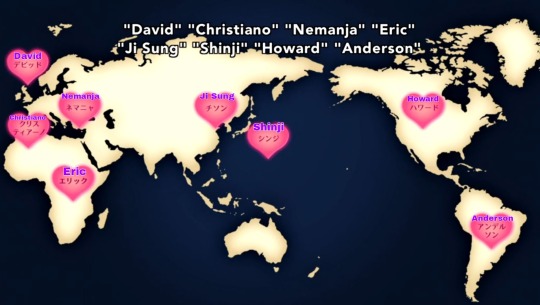
So, it's said that Irina is fluent in ten languages. She's stated that the best way to learn a language is to get a lover who can speak it. The above map is list of some (pretty sure some) of her "lovers" who will help us determine which langauages she speaks.
Note: some of these hearts don't necessary fall over the man's country of origin. For example, Shinji's heart is placed next to Japan's map, likely because it'll cover it if it was placed on top. Likewise, David's heart is placed above Great Britian.
Okay, let's move on to the list:
Serbian: Of course, we're gonna start the list with her mother tongue.
English: Yeah, this one's obvious.
Japanese: Another obvious one.
Japanese Sign Language: As I've mentioned before, she communicated with Karasuma and the kids through sign language during the island arc.
French: Again, the Reaper Arc reveals she's been teaching Megu French.
Arabic: In that same arc, Yada mentioned one of Irina's story involving Arabian royalty and nearly lead to a war. 7 years later, she's sent to infiltrate an organization in the Middle East.
Portuguese: Pretty sure Anderson is from Brazil because apparently, his name is a popular there. I'm not sure how popular though, but we've got some Brazilian celebrities, namely athletes like Anderson Silva, Anderson Varejão, and Anderson Luís de Abreu Oliveira. So yeah, Irina knows portuguese.
Korean: First, we have Ji Sung (also spelled Ji-seong), whose heart is right next to South Korea. Second, in chapter 25, Irina briefly talks about Korean pronounciation.
So these are the languages I'm sure Irina is fluent in. There's still 2 more, and my guesses are:
Spanish or Italian: I'm not quite sure where Christiano is supposed to be from. I initially thought of Spain, but his heart can also be seen right next to Italy, so who knows? Maybe she knows both languages?
Eric...I'm not sure which African country he's supposed to be from, so I don't know which language Irina would acquire ro seduce him. Maybe she didn't have to pick up a new language though, maybe Eric already spoke French or Arabic.
Also, it should be noted Serbia has several minority languages. Maybe Irina is fluent in some of them.
For headcanons, I'd say she'd be fluent in Russian, Chinese, and Vietnamese; all of which she learns during canon or during the time skip.
That's all I've got on Irina. For the second tag, I'll do another post for the students because this one's long enough. However, I can make some language hcs for Korosensei and Karasuma.
Korosensei:
As a once notorious assassin, I don't doubt that he's just as multilingual as Irina is; I just don't know which langauges he would know. I like to think he's fluent in Chinese (Mandarin, Cantonese, and speaks in several dialects) since he keeps flying over to China and because he specializes in he Chinese cuisine.
Karasuma:
English: We did see him use it in Episode 10.
Japanese Sign Language: Again, the island arc.
I like to think that after marriage, Irina insists he learn Serbian since 1) their daughter will have more speakers to communicate with and 2) Irina already speaks his mother tongue, why can't he learn hers?
I can see her suggestively offering her help and like the straight lace that he is, Karasuma declines. Nevertheless, he agrees with her reasons and Serbian becomes their secret language, though they use it even when they don't gave to be secretive.
Also, I can see Karasuma shooting down her advances only in her mother tongue. It's his way of teasing her and Irina starts wondering if asking him to learn Serbian was a mistake...
#assassination classroom#ansatsu kyoushitsu#irina jelavic#Irina should become an interpreter for the UN#how much does the UN pay though? 🤔#either way she should consider being an interpreter or linguist#karasuma tadaomi#tadaomi karasuma#korosensei
51 notes
·
View notes
Text
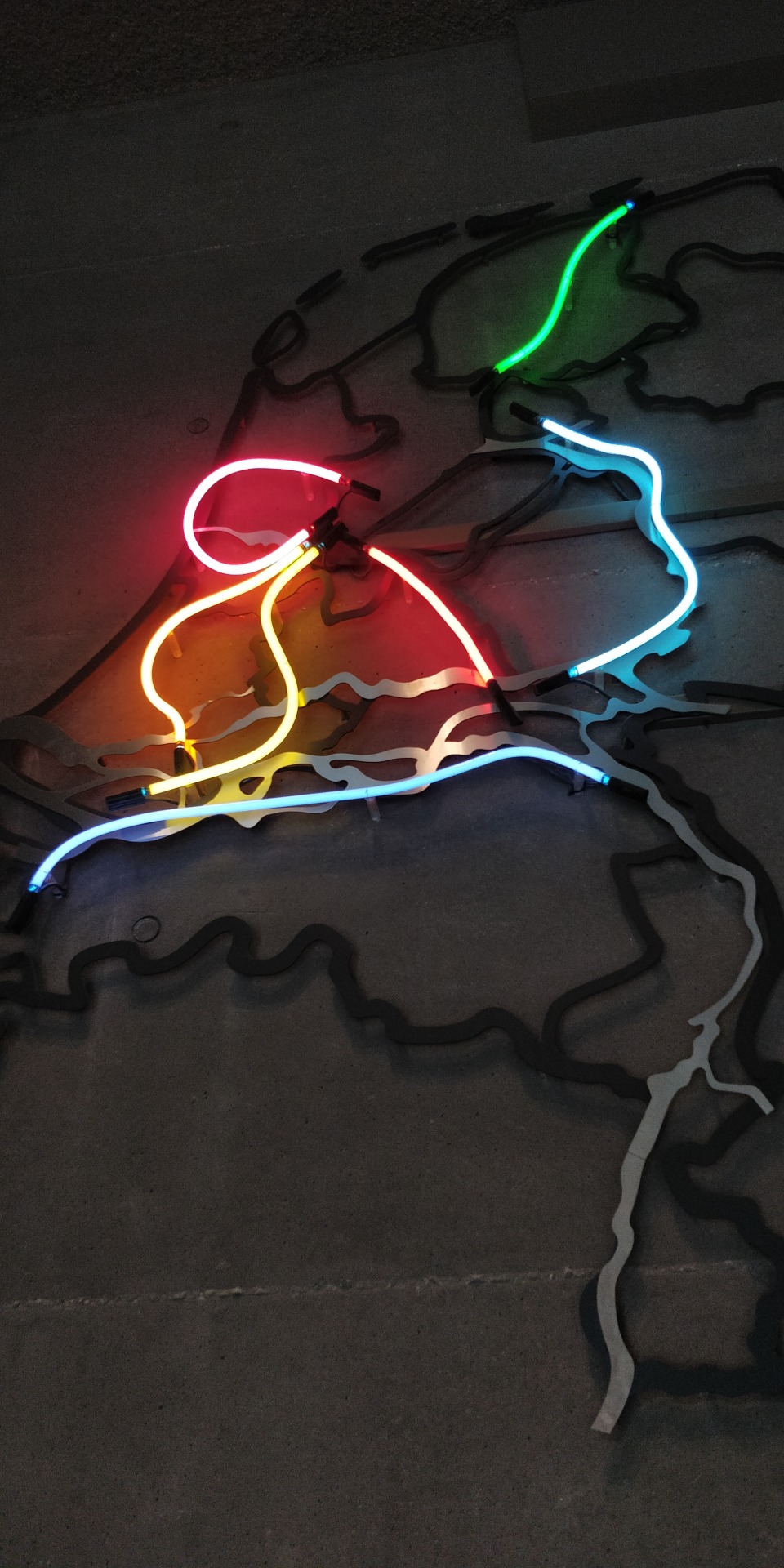


Waterliniemuseum
(Dutch Water Defense Lines Museum) ‘’Where UNESCO World Heritage Sites cross’’
Location: Bunnik, Utrecht, The Netherlands Price: 10,50 Duration: 1 - 2 hours Transport: bus from Utrecht central station, and a short walk Language: Dutch / English (Audio probably also in German, French, Ukrainian, Italian, Turkish Spanish, Chinese, Arabic) Activities: play games, learn history, walk around in nature, play with water Date of visit: Friday 17 March 2023Website
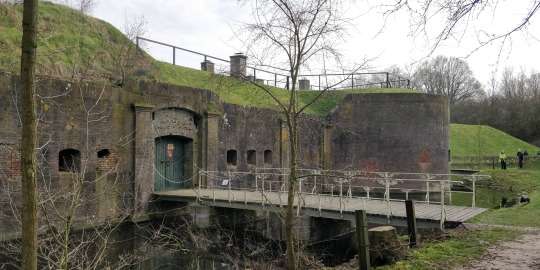

UNESCO
A UNESCO World Heritage Site is a location or monument that is protected because it has a special cultural or physical significance. These places are all over the world, some of the more known ones are Machu Picchu in Peru, the Great Barrier Reef in Australia, Yellowstone National Park in the USA, or The Great Wall of China. There are so far 1154 monuments on the list if you want to check out which one is close to you, there is a map with every monument! In the Netherlands, we have 12 of these monuments, 2 of which cross here! One is the Lower Germanic Limes, which is the northern border of the Roman Empire and follows the river of the Rhine. This horizontal line going from the Netherlands all the way to Greece was protected by a roman soldier from the year 40 to 400 (in the Netherlands at least). This is also how my city came to be, build upon an ancient roman Castellum.


De oud Hollandse Waterlinie
The second one is The Dutch Water Lines, which is an important line of defence in Dutch history. This is a vertical line of villages and farmlands that are so below water level that it's made to be drowned in the protection of the rest of the country. Around the 1500’s the Dutch found out that enemies don't like wet feet, they would drown parts of land if enemies were approaching, these enemies back then were usually the French, Spaniards, or Germans. The Dutch would raise the water level exactly knee-high (50 cm / 20 inches) if you made it too high they would just get a boat, and if it was too low they could walk through it. The villages that would be put underwater would first get a short notice to evacuate of course. So in the Netherlands, you have 3 big rivers protecting us from the bottom, you only need to put guards on bridges, since without those you can simply not cross. But the middle of the country was open to attacks. So this line of land was made, which some higher-up paths, just like the bridges. Even if the land was underwater people could take roads, but on the other hand, it did force armies to take these small predictable roads, with forts full of armies next to em. so they usually just gave up the Old water linies have been used 2 times against the French. The first time worked well and they retreated. The second time the French had leaned and waited for winter, after flooding the lands it froze over, and they could simply walk. However, the French were not prepared that even back then the Dutch were outstanding ice skaters and simply put their army in skates. The French once again gave up.
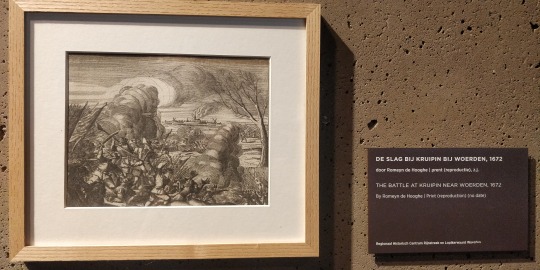

Our savior in WW1 Then they kept bettering the waterworks and moved in a bit to include Utrecht in the protected part. These new water lines were however never put to use again, but that doesn't mean they didn't serve us well. Let's skip some time, 1914, World War 1 started. The Netherlands wanted to stay neutral, and this worked. Not because the Germans were so polite to take everything except for us, but because of the tread that we had our water lines. From found German documents they do talk about the fact that they simply could not take our country as ‘’ one can fight in the desert or the mountains, but no one can fight in mud’’. 1939, World War 2. We said we were going to stay neutral again, But German didn't take it. Quickly we flooded our lands, but that doesn't go as quickly as you might think. The big difference now was that there was a new invention, planes. They simply flew over the water, jumped with parachutes, and absolutely bomb Rotterdam to a pile of rubble. Within 4 days, the Netherlands had given up. I mean to be honest, our military back then were some guys in bikes, we weren't prepared for planes and bombs from them. After this, the water lines were actually used one more time when the Allied forces of the English, American, Canadian, and Polish armies came to free the Netherlands. The Nazis then opened the limes to try to stop them.



What about the museum tho
Well, after reading all of that, you would assume you probably don't even have to go to the museum anymore. But I still recommend it! It is the most fun and interactive museum I have been to yet. When I walked in, I got a little bracelet that I had to personalize with my language of choice and my postcode. Now I could turn on any videos, games and talking statues. Anything scanned will be in your preferred language. And the postcode is used to determine where you live, and to make references to protecting you (if you live left of the waterline). Usually, I love reading everything in a museum, but I was happy that in this museum all information was told to you through audio, videos, and games. There were little booklets on the wall if you really wanted more information, but that felt more optional. Whereas in most museums it's the other way around. Other things you could do at the museum were a VR flight with a sightly moving chair to make you feel like you're really flying over the Netherlands in a parachute. In the middle of the museum was an outside space where they build a replica of the waterline and different dams and doors so you or kids could play around with water while not knowing they are actually learning how it all works. This was closed now tho because it's practically still winter.
Another great thing about this museum was that not all the fun stuff was ‘’for 6 - 12’’ or something. I see a lot of museums having fun interactive learning things, or art workshops, but it's all just for children, bro I know I'm 23 but why can't I do a treasure hunt and answer silly little questions?? In this museum it was not for kids, anyone could do anything.
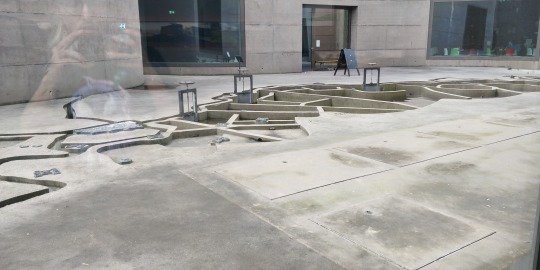
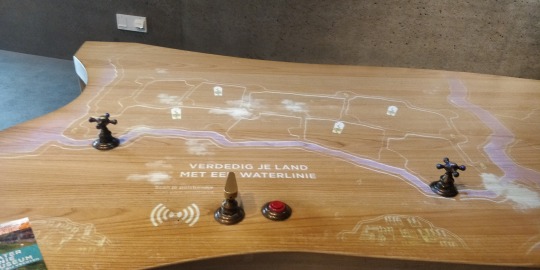

Very Topical
they really keep up to date, as mentioned before, with the VR and other technology. But also on politics. They had this part about the war between Russia and Ukraine. How when Russia attacked they assumed it would be easy to take Kiev quickly. But it turned out to be harder, as Ukraine did the same technique we have been learning about here, they flooded the rivers. It is not as big as here, but it was also not planned. I thought it was so cool to include information like this.
Lastly, I also would like to say that this was once again a museum with friendly people, and that really just makes it all so much better. People that are hyped to teach you about the topics. I started with a guy showing me around the first room, asking me what had piqued my interest to come here and what I hoped to learn, so he could better personalize his story to my situation. Sadly I have no reasons, and I know nothing of this, but I do love learning!

Fort Vechten It is a pretty small museum, to be honest, but that doesn't matter, as along these water linies there are so many forts. Just like the one, this museum was a part of, the fort itself is free to walk around, and the nature there is always beautiful. This is because the waterline and the forts were the property of the military, so no one could build their businesses and other buildings near them. Now that it is protected, it will still not be possible. So all of these areas are green and full of nature. Part of the fort was closed as it was a protected place for bats to sleep the whole winter, the dark thick walls of a fort are perfect for that.


Would I pay the price: no not really I think 7 euros would be the max, and I'm not such a big ‘’waterlinie’’ fan that I would go over that Would I revisit it: Definitely, it was a lot of fun and a nice walk. Who do I recommend it to: Dutch people interested in nature and history. Also, to tourists that are specifically into Dutch history or waterworks. Also very kid friendly Interactive: 5 Educational: 5 Storytelling: 5 Price: 4 memorable: 3 Total score: 4,4



1 note
·
View note
Text
Take It or Leave It
Hi!!!
This is something new I’m trying where the reader is a Lawyer for Tony Stark but after the Avengers get back together after the Accords Ross is still coming after them. Tony Stark wants the reader to get Ross off their backs but what happens when Ross decides to play a little dirty?

Chapter 1 – Chapter 2 – Chapter 3 – Chapter 4 – Chapter 5 – Chapter 6 – Chapter 7 – Chapter 8
“What is this, Tony?” Steve looked from the sheets in his hand.
“It’s a resume.” Steve stared at the man. “Y/N L/N, she’s my go to lawyer. When I met her she had only just started at her firm. She had just finished a case and was handing it in to Hayden Hughes, the Managing Partner at the firm, when I was in his office. Instead of taking me to a senior partner to sign with, he told me to sign with the girl. I’ve never regretted it.”
Steve looked back at the paper. “So you trust her.” It wasn’t a question.
“Listen, Rogers, if there’s anyone you can get you out of your predicament, shall we say, it’s her. Her record runs on a strictly win-only basis.”
“She’s worth a shot, Steve. I may have only met her for twenty minutes once before when she was getting Tony to sign something but she’s a good kid. I don’t think I’ve seen anyone keep him in line as well as she did apart from Pepper.” Bruce looked up from his StarkPad to affirm Tony’s praise of the lawyer.
“Hey! I’m not that bad!”
Natasha spoke up from her quiet conversation with Clint. “You’re only proving his point, Stark. Besides, this L/N lady can’t be that bad; she’s from the best law firm in New York, Hughes and Wood, which means she came from Harvard, the best law university in the country. She’s used to working cases which have high stakes so she knows discretion is key.”
“What’s the worst that she can do? We’re already wanted fugitives.” Wanda quipped in her thick accent.
“Call her, Stark. Let’s see what she can do.”
“No need, Mr Rogers, Mr Stark already called.” You waltzed out the elevator bags scattering your body. “But more importantly, I brought the Chinese.”
“We’ve already eaten.” Steve turned to look at you front on.
You laughed. “Oh that would be a good joke if takeout menus weren’t scattered across the coffee table, members of your team weren’t holding the aforementioned menus, half the people didn’t perk up at the thought of food and I didn’t get all of your favourites.”
“How would you know our favourites? You have never met us.” Wanda queried. Her distrust for you was clear on her face and through her body language.
“Then how can I do this, Miss Maximoff?” You plopped most of the bags on the floor apart from the food. “Crispy Shredded Beef for Mr Stark, Chicken Chow Mein for Dr Banner, Sweet and Sour Chicken Balls for Captain Rogers, Szechuan Spare Ribs for Miss Romanoff, King Prawn Chop Suey for Mr Barton, Honey Pork for Mr Odinson, House Special Foo Yung for Miss Maximoff, Special Crispy Noodles for Mr Vision, Singapore Mixed Meat Chow Mein for King T’Challa, Stir Fried Mushrooms in Black Bean Sauce for Mr Lang, Shrimp Chow Mein for Colonel Rhodes, Beef Shanghai Style for Mr Wilson, Chicken Singapore Noodles for Mr Parker, and finally Crispy Chicken Fillet and Roast Duck Fried Rice for Sergeant Barnes.” You finished as you placed the final tub on the table.
“Oh that’s it. She’s my favourite lawyer.” Clint fist pumped the air dramatically.
You raised an expectant eyebrow. “Oh, I’m sorry, did you miss the memo? I wasn’t done. I also got Prawn Crackers, Prawn Toast, Crispy Seaweed, Spring Rolls, Crispy Wontons, Salt and Pepper King Prawns, Honey Roast Spare Ribs, Yung Chow Fried Rice, Fried Dumplings, Deep Fried Crab Claws, Aromatic Crispy Duck and finally Fortune Cookies for a bit of fun.”
“I think I’m in love.” Scott whispered, staring at you.
Ignoring the blubbering man, you pulled out a gift bag from the collection around your feet. “Sorry I couldn’t make your birthday Mr Stark, you know I had court the next day and you can’t arrive in court under influence.”
“Sure thing, Bunny, no worries.” The man smirked as the nickname came out again. Apparently when you were working or thinking your nose scrunched up and Tony had made it his job to entitle you with a nickname because of it; he thought of Bunny to be a sufficient name. Either way, everybody was watching with rapt attention as Tony removed the black tissue paper from the top of the bag and pulled out the box inside. Tony’s face lit up at the sight, prompting the question.
“What did Lawyer Lady get ya, Tin Man?” Sam asked expectantly, like a petulant child.
Thankfully Vision saved him from his despair. “It appears to be a Glen Garioch 46 Year Old 1958 Whiskey, average pricing around $2,777.”
Low whistles ran throughout the men of the room.
“Vis! You don’t tell people the price of gifts!” Wanda gave an exclamatory hiss in said man’s direction causing him to frown in thought.
“Damn, L/N. That’s good whiskey.” Sam addressed you but his eyes were still on the bottle.
“If you play your cards right, Mr Wilson, you might get gifts like that too.”
He shot you a flirty smirk. “I’ll play you any cards you want if it gets you around here more often.”
“I’m surrounded by people like Mr Stark, and more, all day, Mr Wilson, you’re going to have to do better than that.” You pouted slightly at the man, fully enjoying the little exchange.
“I like her. I’ve been telling you for a long time, Birdbrain, you’ve got to up your game.” James permitted himself to join the conversation.
“Damn, and here I was thinking the only person you like was you boyfriend: The Star-Spangled Man with a Plan.”
“Didn’t you get anything for yourself, Miss L/N?” Peter asked you as he leant forward to get his noodles.
“I got the Szechuan Spare Ribs. They’re the best thing on the menu.” You replied with a nod towards Natasha.
“Amen to that, sestra!” She raised her beer to you and it reminded you of the other bag.
You pulled out the beer that you had brought with you, alongside the Chinese. “Vy khotite drugogo?” You held out a bottle for her.
“Ty govorish’ po-russki?” She looked surprised as she took the bottle.
You nodded. “My parents were quite pushy and strict when I was younger. They made sure I knew as many languages as I could so I would be well prepared for life.” You took a can opener from your bag; you were starting to feel like Mary Poppins. Carefully popping the cap off your bottle, you offered the opener to Natasha and she gratefully accepted.
“It’ll be fun to have another Russian speaker in the mix.” James stirred his food quietly before taking a bite.
“The Three Musketeers.” Clint raised his bottle to us jokingly.
“Any other talents we should know about, Sweetcheeks?” Sam wiggled his eyebrows and you simply gave him an unimpressed look.
“Alongside Russian and English, I also speak French, German, Portuguese, Spanish, Latin, Italian, and Mandarin. Fluently. Mum made me do Ballet and Gymnastics whilst my Dad made me do martial arts whilst growing up. And I had to learn the piano at school.” You listed them off with an impressive air of nonchalance.
“You have the skill set to join the Avengers.” Scott announced dramatically whilst chewing on his mushrooms.
“And you clearly didn’t read the resume.” You quickly rebutted, taking a swig of your beer.
“What’s making you say that?”
“Honestly, Mr Lang, it’s obvious.” You shook your head to yourself. “The only people who have read my resume in this room is Mr Stark about 9 years ago; Miss Romanoff, Mr Barton and Sergeant Barnes all have read it because they wanted to assess my threat level to themselves individually and the team, hence why they have been carrying most of the conversation as they are trying to evaluate me; Mr Vision will have read my resume due to the fact that he has never seen or interacted with a lawyer before; and finally Captain Rogers will have read my resume as he doesn’t trust me in the slightest right now, his feet are angled ever so slightly towards me showing interest, he hasn’t spoken at all to me apart from a defensive lie at the beginning and now he’s contemplating on how to talk to Tony about me after I’m gone without causing conflict. Tell me I’m wrong.” No one said anything. You stood up from your seat and gathered your bags. “Mr Stark, I presume I’m in the usual room?”
Tony let out a tired sigh. “Yeah, Bunny. Please just call me Tony for the millionth time.”
“Of course, Tony.” The pair of you shared knowing smiles as you picked the bags up and disappeared down the hallway.
#avengers imagine#marvel#marvel imagine#avengers#avengers x reader#Chinese food#steve rogers x reader#bucky barnes x reader#natasha romanov#natasha romanoff x reader#wanda maximoff#wanda maximoff x reader#tony stark x reader#Lawyer!au#avengers!lawyer#marvel!lawyer#lawyer!reader#Steve rogers#sam wilson#sam wilson x reader#falcon#captain america x reader#captain america#james barnes#clint barton#hawkeye#clint barton x reader#bucky barnes#winter soldier#winter soldier x reader
2K notes
·
View notes
Text
Delivery Service iOS & Android App with E-Commerce Module (Mobile)
Delivery Service iOS & Android App with E-Commerce Module
Create your own E-Commerce app with our CMS and this design template.
If you wish, you can add additional modules, such as the integration of a restaurant menu card or a reservation system to the app.
Features included in this demo app
E-Commerce Module
In App Payment with PayPal, Stripe, or cash after delivery
Loyality card with bonus function
Facebook Integration
Contact Form
Places list with Google maps
Admin Login directly in the app
In App Messages
Job Board
Push Notifications
Event calendar
News wall
Other modules that you can add to your app for free with the CMS
Image Gallery
Booking System
Images from Facebook or Instagram
Videos from Youtube or Vimeo
In App Messages
Menu Card
Reservation form
Twitter integration
RSS Feeds
WooCommerce, Wordpress, Appointment for extra payment
and much more…..
This languages are possible Czech, German, Greek, English, Spanish, French, Italian, Dutch, Portuguese, Russian, Turkish, Chinese. If you need a different language, we will be pleased to send you a csv language file which you can translate independently.
You can easily change all images, icons and text data with the CMS. Once you’re finish, we’ll create the new source code for your Android and iOS app. Now you can create the .apk and the .ipa file and upload it in to the App Stores.
A re-upload to the app stores is only necessary if you want to change the start images of the app or the App icon etc. Any changes to the app itself do not require this.
In our FAQ you will find information about all the modules we offer. If you have further questions, please do not hesitate to contact our SUPPORT TEAM.
What is included in the package?
You get the complete iOS & Android source code of the original demo App directly after the purchase. You can edit the source code by yourself with our CMS. After you’ve finished editing the app, we’ll create the updated source code.
If you wish, our technical team can also create the .apk and .ipa files for the stand-alone upload to the App Stores. This service is available at a surcharge.
The CMS access is free of charge for you as an Envato customer. After registration you will be given access to the app content management system within the next 24 hours and can be edit to your app. Our team is avaiable on working days between 9 am and 6 pm (Central European time) and we will create your account to the CMS within a few hours.
The complete access to the CMS is in the first year free. From the second year you have only access to the CMS to send Push notifications.
The Content Management System
On the Dashboard, you can make changes to your app on the web and directly in the app.
Send push messages only with simple text, with text and link or with text, link and image. You can send push messages to a special user or messages to all users. You can also send a push messages to selected locations only.
Last but not least, you have the option to send the push messages immediately or to a specific date and time.
You do not like the colors or the navigation of the app?
No problem! With the CMS, you can easily select another navigation design or change the colors, text and pictures of the app.
Of course, you can also publish news, edit the menu etc. Basically, you can edit your entire app and after you have saved it, the change will be immediately visible in the app.
Please note: Changes like, start pictures, app icon, the name of the app or the push icon are only possible before the app is published. If you want to do these kind of changes afterwards, the app has to be re-published and you must upload the app to the stores again.
Ready to use App
If you wish, we can create the complete iOS & Android app for you! To do this, please purchase this app template and contact our support team.
We are editing the existing app template. All modules contained in the App Template are adapted to your requirements. We change the texts, the logo, the pictures and adapt the colors to your wishes.
All images and texts with instructions should be provided to start the project.
We integrate in to the app all the features from the demo app with your content.
E-Commerce modul or restaurant menu max. 10 products in the price included.
Appointment modul max. 3 employees and one locations
Catalog module max. 10 products
You can always add additional products by yourself or we add them at a surcharge.
Other features that are not included in the app can be booked at any time for an extra charge.
This service is possible against an extra payment.
from CodeCanyon new items http://ift.tt/2z51Tl6 via IFTTT https://goo.gl/zxKHwc
0 notes
Photo

On Not Knowing (Modern) Greek
By Johanna Hanink
Virginia Woolf’s essay “On Not Knowing Greek” was published in 1925, the same year as Mrs Dalloway. The title gestures not to Woolf’s (nor to anyone’s) ignorance of Ancient Greek syntax, morphology and vocabulary, but to the impossibility of knowing today “how the words sounded, or where precisely we ought to laugh, or how the actors acted.” The essay is nevertheless an encomium of ancient Greek thought and literature, and, ironically, a testament to Woolf’s own fine command of the ancient language.
I think of it sometimes when I reflect on two frustrations I have about “not knowing” Modern Greek: a version of Greek in which you can, in fact, hear words, laugh on cue, and watch actors act. The first is with myself, because I wish I knew the language better. The second is with the field of Classics, for not institutionally valuing—and for even dismissing—any aspiring classicist’s efforts to learn it. After all, the thinking goes, those hours would be better spent on Homer and Thucydides (or even “German for Reading”: leave it to us to kill off a living language).
Classicists like equally to brag and complain that they have to learn a lot of languages. Most American PhD programs require exams in Ancient Greek, Latin, German, and either French or Italian: if you know either French or Italian, the thinking goes, you can fake your way through the other.
These languages are the tools of the trade, but they are also metonyms for the philological traditions that we are expected to put on a convincing show of knowing—with, say, the occasional name-check of Wilamowitz. Once you decide to get serious about the field, you learn to take these traditions for granted as the most inherently valuable. The history of European classical scholarship is entangled with the esteem that Greek and Latin have enjoyed in countries where German, French, Italian, or English is spoken. Many scholars who identify with the European classical tradition assume that any scholarship worth reading, or at least citing, will be in one of those four languages.
On the one hand, the modern language requirements of Classics PhD programs should really start to reflect that interesting and important things have been said and are being said about Greco-Roman antiquity in countless languages other than English, German, French, and Italian (why not accept Turkish or Arabic or Chinese—isn’t, after all, scholarship really just a form of “reception”?). On the other, the absence of Modern Greek from the list of discipline-approved languages is itself curious, and stranger still if you consider how classicists love to spend time, and to talk about spending time, in Greece.
Like fourteen European countries and two other former British colonies (Canada and Australia), the United States has a home base for its archeologists and classicists in Athens, at the American School of Classical Studies. It should go without saying that plenty of scholarship has been and continues to be written in Greek; Greek universities often have enormous Classics departments. There is simply more information in Greek about Greek archeological sites, both at the sites and in print. And for better or for worse Greek antiquity is more urgently present in national conversations (and at bookstores and on social media) in Greece than anywhere else.
So why does Modern Greek still not have a seat at the classicists’ table? This is, bluntly put, largely because our discipline continues to take a colonialist view of, among other things, Greece, Greeks, and (Modern) Greek. Historians and anthropologists who work on Greece have been much more willing than classicists to acknowledge the country’s legacy of metaphorical colonization: not by the Ottomans, but by the early European antiquaries and travelers who planted their flags in the ruins of Greek antiquity.
At a time when European powers were scrambling to expand their empires, the travelers’ influential approach to the Ottoman-held “Classical Lands” was, as historian K.E. Fleming points out, “representative of a different form of colonialism, in which the history and ideology, rather than territory, of another country” is “claimed, invaded, and annexed.” Viewed through the lens of the present, the people who undertook this more “symbolic” colonization of Greece look a great deal like early versions of classicists.
Thanks to their proprietary attitude toward antiquity, they largely discounted local knowledge and described local people as apathetic to the ancient past whose ruins they seemed to live so blithely among (see here for evidence to the contrary). This kind of thinking was in turn used to justify, among other things, the removal of antiquities from Greece to countries where, supposedly, they would be better appreciated and cared for. All of this makes for a very long and complex story—one in which Greeks were hardly passive participants.
One of the story’s many legacies is that classicists trained in the “Western” classical tradition tend to disregard Modern Greek as a scholarly language, while Greeks who want to participate in the tradition—to have their voices and ideas heard abroad— earn degrees in other countries and publish their research in English, German, or French. Granting Modern Greek a more valued place in the professional conversation would be a positive step for a field that, on the point of colonialism, has a lot to answer for.
Beyond the political argument—and on the more personal, spiritual level that Woolf evokes in her own essay—the struggle to learn Modern Greek can bring a special kind of joy to those of us who first came to the language in its ancient form. That joy is the main reason I recommend that classicists spend at least a little time on Modern Greek, and ignore the gnawing voice that will say it’s a waste of time.
In a recent blog post (“What does the Latin actually say?”), Mary Beard makes an important point: for a lot of people it is hard for people to learn dead languages because we learn them passively. “It is both the plus and the minus of Latin,” she writes, “that we never have to ask for a pizza, or the way to the swimming pool, in it.”
My own learning style is certainly more “verbal” than “logical.” I like to talk, so I make much slower progress at learning dead languages passively than at learning living languages actively (my German is bad, but I could think of no greater waste of my own time than a “German for Reading” class). Modern Greek, of course, is not Ancient Greek: the linguistic politics here are particularly delicate and complex for historical reasons. The pronunciation can be a psychological barrier, and the language has changed since antiquity: classicists are often especially surprised to learn that infinitives have long since passed out of use. Greek also brims with borrowings from Turkish, Albanian, Italian, French, English…. But so what? Classicists’ own modern language requirements count Italian and French as substitutes for each other.
There’s no denying that having to decline Greek nouns when I order a pizza, or manipulate Greek verbs when I ask the way to the swimming pool, has brought even the ancient language to life for me. After years of studying Modern Greek, I have a far better recall for vocabulary, handle on verb forms, and instinctive sense for accentuation. The time I have dedicated to Modern Greek is some of the best I have spent as a classicist, since it has given me a sounder, more internalized sense of the ancient language (a better Sprachgefühl, as a more responsible classicist might say).
It’s fun, too, to learn how meanings of words have changed over time. For years ὁφόρος was, in my mind, the tribute paid to Athens by its Delian League allies. Now the word just means “tax” (inasmuch as tax ever “just” means tax). Being αγαθός nowadays is not usually such a good thing. A στήλη can be a “column” in a newspaper (or on Eidolon). In chapter 4 of thePoetics, Aristotle observes just how much pleasure people take in learning and inferring: in looking at an image of someone and recognizing, “Oh, that’s him” (οὗτοςἐκε��νος, 1448b).
Making connections between two things—hearing a new word and realizing you already know it, just differently—sends a spark of joy through the brain. And anyway there is something to be said for a language that allows you to describe a tall, fit guy as a kouros in everyday conversation.
The twists and turns of Greek linguistic history also mean you can play specifically with avoiding Ancient Greek. Oftentimes there is a choice between describing something with a “high-register” word with ancient roots or a “low-register” vernacular or foreign word. Liver, for example, is συκώτι (derived, like Italian fegato and French foie, from a word for “fig”), but when the matter is a disease of the liver the more classicist-friendly ήπαρ is common. Speaking of liver, who would you buy it from: the κρεοπώλης or the χασάπης? The one features in beginning Ancient Greek textbooks; the other comes from Turkish. A Greek professor of Latin once told me that he revels in speaking English precisely because it offers similar opportunities to play with the nuance of register: between Anglo-Saxon, French and Latinate diction (to use a classic example, does Elizabeth II strike you as queenly, royal, or regal?).
The Facebook page Ancient Memes exploits the space between these levels by captioning “high-register” artworks with dialogue in very modern, “low-register” Greek. Reading things like Ancient Memes, or my few copies of “Aristophanes in Comics,” has introduced new playfulness into my approach to Ancient Greek. And play, of course, is one of ways we learn best.
So what is still keeping many classicists (again, leaving the more political argument aside) from seizing the real practical benefits that Modern Greek has to offer: the opportunity to spend time in Greece more comfortably, the chance to collaborate with Greek colleagues more substantively, the opportunity to bolster our grasp of the language and its extremely longue durée, and to procrastinate by laughing at Ancient Memes?
When I posed a version of the question to a professor in Thessaloniki, he had a good answer. Classicists, he suggested, are easily embarrassed and afraid to make mistakes. Making mistakes is crucial for language acquisition, and sometimes the mistakes will be horribly embarrassing ones (I have, in polite conversation, said τσιμπούκι when I meant τσιμπούρι). Once, after I paid for books at a bookstore in Greece, I overheard the woman who had just rung me out ask a colleague with genuine bewilderment: “What does she want with an Ancient Greek book if she can’t even speak Greek?” In a field that already demands so much posturing, so much pretense of knowing Greek and Latin, risking mistakes and “not knowing” means risking a lot of your ego.
But it’s worth it. Learning Modern Greek, at least to the extent that I have managed to learn it, has made both my life and my relationship with my work all the richer. I haven’t even mentioned the unique pleasure that modern Greek literature offers the classicist. That sheer enjoyment aside, few people have been more influential in shaping modern views of Greek antiquity than George Seferis, or have problematized the periodization of Greek poetry more than Constantine Cavafy (translated into English most recently by critic and classicist Daniel Mendelsohn). I first came to Modern Greek after reading Seferis’ essay “Delphi” (Greek here), but since then have actually come to prefer paddling around in Greek literature’s less classical waters.
Nevertheless, since I’m teaching ancient Greek mythology again this semester, the text I’m most excited about right now is Auguste Corteau’s Νεοελληνική Μυθολογία. It is a parodic re-imagining of ancient Greek myths: on one page, Erebus makes a move on his sister Nyx: “Hush you idiot,” she replies, “Mom’ll hear and call Social Services.” Later, Kronos appears on the beach and informs his father he’s come to play paddle ball. “But I don’t see any balls,” says Ouranos. “Nor will you ever again,” says Kronos.
Now, with the prospect of a long plane ride ahead of me, I’m looking forward to having a few quiet hours with the book—no matter how much of it I manage to understand, or how often I know when I ought to laugh.
Johanna Hanink is Associate Professor of Classics at Brown University, US.
Daily inspiration. Discover more photos at http://justforbooks.tumblr.com
1 note
·
View note